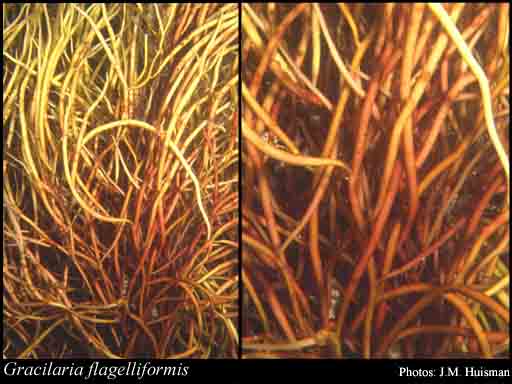- Reference
- Mar.Benth.Fl.S.Australia IIIB:25 (1996)
- Conservation Code
- Not threatened
- Naturalised Status
- Native to Western Australia
- Name Status
- Current

Scientific Description
Habit and structure. Thallus dark red-brown, 20–60 cm high, irregularly laterally branched at intervals of 1–6 cm below, upper parts often unbranched for many centimetres, branches terete, 0.5–1 mm in diameter above, usually markedly thicker (2–3.5 mm in diameter) near the base where the cortex is thickened. Holdfast discoid, 2–6 mm across, with one to several stipes; epilithic. Structure appearing multiaxial, pseudoparenchymatous throughout, with an even gradation over many cells from small outer cortical cells 4–6(–8) µm in diameter and L/D (1–)2–4, arranged in anticlinal rows which extend to many cells long in older basal parts, through radially elongate cells (L/D 2–4) of the inner cortex and outer medulla, to the inner medulla of large and small cells intermixed, the larger cells ovoid, 50–120(–160) µm in diameter, with very numerous secondary pit-connections and walls becoming 10–20 µm thick; medulla (15–)20–30 cells broad. Rhodoplasts discoid.
Reproduction. Gametangial thalli dioecious. Carpogonial branches not observed. Carposporophytes with a basal mass of gonimoblast cells and probably a small basal fusion cell, and upper gonimoblast filaments producing short chains of ovoid carposporangia maturing terminally, 15–25 µm in diameter, with traversing nutritive filaments. Cystocarps ovoid, 1–1.6 mm across, slightly basally constricted; pericarp massive, with anticlinal chains of cells mostly 10–25 µm across with prominent lateral secondary pit-connections, and with an ostiole lined with chains of short cells cut off from pericarp cells; inner pericarp prominent. Spermatangia in deep pits, some becoming compound, 40–150 µm broad and up to 175 µm deep. Tetrasporangia in surface sori around the branches, in a slightly thickened cortex, basally pit-connected to mid cortical cells, elongate-ovoid, 30–55(–70) µm long and 12–25(–40) µm in diameter, cruciately divided.
Distribution.Geraldton to Geographe Bay, W. Aust. (doubtfully further south).
[After Womersley, Mar. Benthic Fl. Southern Australia IIIB: 25–27 (1996)]
Distribution
- IBRA Regions
- Swan Coastal Plain.
- IBRA Subregions
- Perth.
- IMCRA Regions
- Central West Coast, Leeuwin-Naturaliste.
- Local Government Areas (LGAs)
- Capel, Cockburn, Cottesloe, Dandaragan, Irwin, Mandurah, Rockingham, Wanneroo.